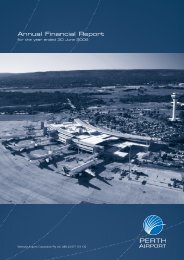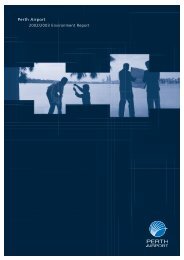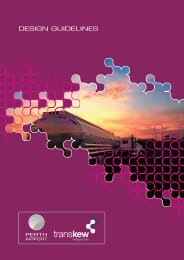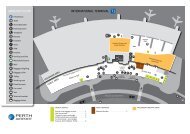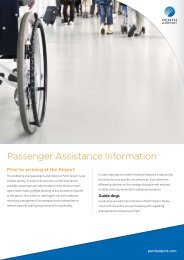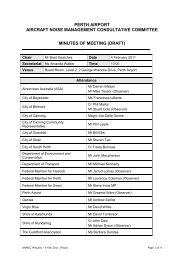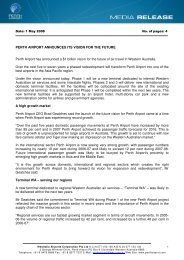4.78 MB - Perth Airport
4.78 MB - Perth Airport
4.78 MB - Perth Airport
Create successful ePaper yourself
Turn your PDF publications into a flip-book with our unique Google optimized e-Paper software.
The main responsibilities of the audit committee are to:<br />
• review and report to the board on the annual financial report and all other financial information published by the company or released to<br />
the market;<br />
• assist the board in reviewing the effectiveness of the organisation’s internal control environment covering:<br />
- effectiveness and efficiency of operations<br />
- reliability of financial reporting<br />
- compliance with applicable laws and regulations<br />
• approve the risk management framework, monitor its effective operation including the purchase of insurance contracts for certain risks;<br />
• recommend to the board the appointment, removal and remuneration of the external auditors, and review the terms of their engagement,<br />
the scope and quality of the audit and the auditor’s independence; and<br />
• review the level of non-audit services provided by the external auditors and ensure it does not adversely impact on auditor independence.<br />
In fulfilling its responsibilities, the audit committee receives regular reports from management and also meets with the external auditors at<br />
least three times a year. The external auditors have a clear line of direct communication at any time to the Chairman of the audit committee.<br />
They are invited to attend committee meetings and receive copies of the relevant papers and minutes.<br />
The audit committee has authority, within the scope of its responsibilities, to seek any information it requires from any employee or external<br />
party. It reviews the annual representation letter from the management on the adequacy, integrity and completeness of the financial systems<br />
and financial statements the Board receives.<br />
RISK ASSESSMENT AND MANAGEMENT<br />
The company’s focus on risk management recognises that it is, prima facie, an issue for senior executives. The corporate risk management<br />
framework supports this focus and provides a structured context for personnel to undertake an annual review of the past performance of,<br />
and to profile the current and future risks facing, their area of responsibility.<br />
This risk information is consolidated and used as key input to the annual corporate strategy workshop attended by senior executives and<br />
operational management. This is held each year away from the day to day pressure of operational activities and provides specific focus on the<br />
identification of the key business and financial risks which could prevent the company from achieving its objectives. Each key risk area is<br />
assigned to a relevant senior officer. That person is responsible to ensure that appropriate strategies and controls are in place to effectively<br />
manage that risk. The overall performance of each year’s risk management plan is monitored by the audit committee on an ongoing basis.<br />
CAPITAL MANAGEMENT POLICY<br />
The board has adopted a prudent approach to treasury management through the development of a Capital Management Policy. This policy<br />
is aimed at promoting greater financial discipline in areas of shareholders distributions, leverage, hedging, liquidity, funding of capital<br />
expenditure and compliance with senior debt covenants.<br />
REMUNERATION<br />
It is the company’s objective to provide maximum stakeholder benefit from the retention of a high quality Board and executive team by<br />
remunerating directors and key executives fairly and appropriately with reference to relevant employment market conditions.<br />
During the year, the parent company’s (ADG’s) shareholders unanimously approved the payment of $1m pa of Directors Fees to Directors of<br />
WAC. The shareholders directed WAC to enter into a Directors Remuneration Scheme (DRS).<br />
The WAC Board have approved the implementation of the DRS, which provides for payment of directors fees to directors appointed by<br />
shareholders in proportion to the respective shareholding of each shareholder in the parent entity (ADG).<br />
Where shareholders have elected, their representative director receives the proportionate directors fee. If shareholders elect for their<br />
representative director not to receive any remuneration, the shareholder receives the proportionate director fee as consideration for the<br />
procurement of the representative director.<br />
7



